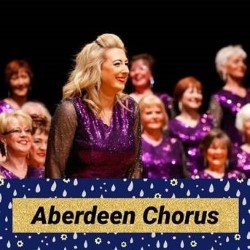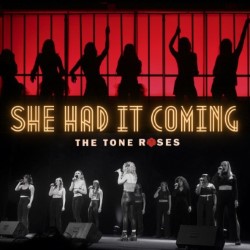Theatre maker, musician, clown and reviewer Pat Silver shares her thoughts on this popular fringe niche.

NEW! Pat Silver’s shows to see in the last week for Edfringe 2022.
Aca-cool!
“But where is the music?” “ I don’t see the drummer but I hear one.” “I sing in a group. Is it ok if we just bring the piano player? We’re mostly a cappella.” So what is a cappella? In Italian, a cappella means “in chapel or choir style.” A cappella is singing without instruments, so, no, you can’t bring your piano player to the gig.
A cappella has taken the world by storm. From the enormous success of the three Pitch Perfect movies to the billions (literally) of YouTube views for Pentatonix, to the Broadway stage and again this year to Edinburgh Fringe, a cappella has shown universal appeal.
“Every species on earth has a voice, a sound, a timbre, a desire to communicate. We use that voice to warn of danger, to soothe a newborn, to barter and seduce a lover. Once we learn of the extraordinary power of the voice, we temper in such a way to gather in numbers to sing the praises of life, to celebrate the garden of possibilities that lay before us, and embrace our differences. There is no price tag on ownership – the one gift we carry with us from birth to death. The time between we talk, we scream, but most of all we sing!” Bill King, Director of Strategy and Engagement, SING! The Toronto International Vocal Arts Festival
“A cappella is resonating with audiences worldwide as the voice is the original instrument, capable of telling stories, healing, communicating, bringing honest emotion and expression with every breath and sound.” Suba Sankaran, looping artist, composer, FreePlay duo

By my count, there are at least 23 a cappella groups performing at the 2022 Edinburgh Fringe, primarily contemporary a cappella and some barbershop. They are university students, community groups, and touring pros, all presenting what the voice alone can do. There are fun show titles like “I’ll Tell You Mine” (Oxford Belles), “Thistle Be a Reigny Day” (Aberdeen Chorus), “She Had it Coming” (Tone Roses) and “On Wednesdays We Wear Maroon” (The Bristol Suspensions) – do we want to know what they wear on other days? Then there are clever group names like Semi-Toned, Aquapella, RadioOctave, Aca-Pocalypse, The Oxford Alternotives, and Foot Notes. Aca-cool!
So who are they and why are they singing unaccompanied? Some are newer at the genre.
“The Oxford Belles were established in 1995 to combat the university’s male-dominated music scene (at Oxford University). Ever since, we’ve spread our message of female empowerment all over the world. As a university group, we take on new members every year, and say goodbye to old ones. That means we’re constantly learning new ways of singing to complement each other’s voices, since none of us is as good as all of us. From year to year, even performance to performance, we find a new sound, which is as exciting as it can be nerve-wracking!”
And then there are the more established touring professionals like The Magnets, returning to Underbelly with their new Legends Show. Their original line-up from the late 90s all met at university and were the first UK based A Cappella pop group to sign to a major record label (EMI 2001). Nic Doodson, who runs Choir of Man, was a founding member in his university days “Fringe always feels like home coming home for The Magnets and we’ve been there since the early 2000’s. It’s an incredible showcase platform for our new shows.”
A cappella can take the listener around the world – without leaving their seat. Canadian two-voice, live-looping duo, FreePlay, is contemporary in nature, deftly crosses genres (pop, jazz, world, classical, folk) and representing centuries of music. For them, the unaccompanied voice becomes the common thread making the music accessible to everyone.
Often the presentations are fun and a bit cheeky, like the University of Bristol’s Academy and Pitch Fight groups’ parody of The Apprentice TV show, called Aca-prentice, or The B-aca-chelorette – on their journey to find love- by The Rolling Tones. Many put a new spin on old standards, like the Full Score Choir from Durham University singing barbershop renditions of musical theatre tunes, Disney, Queen and Elvis, or Ages of Icons show crooning Frank Sinatra to Bruno Mars and the Beatles.
The majority of a cappella shows this year are at theSpace venues. I asked Charles Pamment, the Director of theSpaceUK, why he has programmed so much a cappella.
“We offer the most diverse platform at the festival. We embrace all genres of live work. A cappella is one of them. It’s a hugely popular genre for participants and audiences. It embodies community and is really something that presents itself as something all could do. The cover version nature of much of the work gives it that west end feel that is forever popular with all age demographics. The genre is sometimes seen as for specific tastes, you like it or don’t but we see lots of audiences trying it out and enjoying it. The genre sells very well and there is very much an audience community who see lots of the genre. This genre has become hugely popular across university groups so it has a large participant following.”
The Fringe is a tough slog. A singing group getting noticed above the highly visual costumed street artists or the electric guitar players busking for change is tough. Canada’s 13-voice ensemble Countermeasure met the challenge in a variety of ways.
“When we played Edinburgh Fringe, it felt like we had an edge. You can only promote a play with flyers and posters. We lugged our gear through shopping malls and downtown corridors and blasted the passersby with live music. We sang every chance we could, and little by little, we built a following. By the end of the run, our shows were selling out. You’re competing with fifty thousand other performances so you need to give people the chance to point and say THAT! That looks fun. A cappella music is versatile that way.” Aaron Jensen, Music Director, Countermeasure
A cappella groups by nature are often a large cast, from the barbershop quartets up to 45 or more in a chorus. Playing Edinburgh Fringe is costly, for travel, accommodation, food, registration and venue fees, advertising and more. So why play the Fringe? Is there life for these groups after The Fringe?
Some groups come in hopes of reviews and securing touring internationally. The SING! Toronto festival has scouted groups from The Fringe and brought them to Toronto to perform. Other groups come for the fun. “Few chase awards but come to enjoy themselves as young people and embrace what ultimately becomes healthy competition, hugely social and great fun.” Charles Pamment.
“We’ve made long-lasting friendships and musical connections with audiences, performers and the wider community at Edinburgh Festival Fringe, Adelaide Fringe, and at performances in over 20 countries across 6 continents over the years.” Suba Sankaran
This year’s Fringe a cappella performances offer a wide variety of experiences, from witnessing the development of young university singers – and the sheer fun they have in their shows – to strolling down memory lane with old favourite tunes to the cutting-edge beatboxers. The voice alone offers so many possibilities. Who needs a piano!



















































